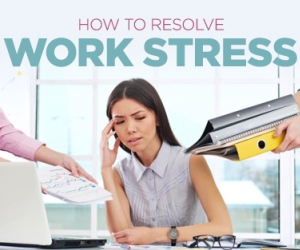How to Achieve a Better Work/Life Balance
Know your priorities
One of the toughest things in this digital age in which we live is learning to properly balance your work and personal life. If you fail, you’ll be unhappy and risk lower productivity in all areas. It’s important to have balance, so that you can be happy in your relationships and do your best at your job.
It’s essential to assess your priorities to determine if your work/life balance is right for you. Our experts share their tips on how to properly examine your priorities and find the appropriate balance.


Know if you’re over-committed
If you’re dedicated to having a balanced life, the only way you can achieve it is if you know whether or not you are over-committed.
Although it can be hard to estimate how much time everything is going to take, it isn’t that difficult to recognize when too much is squeezed into too little time. You need to be realistic about what you can achieve in a particular time frame. Knowing in advance if you need extra time and resources can prevent a great deal of stress, said Maura Thomas, speaker, trainer, founder of RegainYourTime, and author of Personal Productivity Secrets and the upcoming Work Without Walls: An Executive’s Guide to Attention Management in the Age of Distraction.
“When you can look at incoming projects, activities, or opportunities within the context of things to which you are already committed, you can make informed decisions about what to accept, when you need help, and what kind of due dates are achievable and realistic,” Thomas said.
“To achieve balance in your life, you want to be sure that one aspect of your life doesn’t eclipse all others. Another perspective on balance is the idea of being “present”— both in your personal life when you are trying to enjoy some recreational activity and in your professional life when you are trying to work productively,” she said.
Sometimes people wait too long to assess whether they have balance, and only recognize it once something is off kilter, whether it’s their career, marriage, finances, nutrition, education, family, exercise or spirituality, said Stephanie Merchant, food and lifestyle expert and founder of The Nutrition Mom.
It’s important to take action quickly, once you feel something is slipping.
“Often we tell ourselves our singular focus on work will be temporary until the special project is completed, until the promotion is achieved, etc. Which can be true. We just don't want to wake up years later and realize what we are suffering the consequences of neglect in other areas by having our blinders on,” Merchant said.
Don’t let yourself become too distracted to focus on the essentials in your life. The plethora of communication tools, from smartphones to tablets and laptops, make it easy to work from anywhere, so people become tethered to their job and work non-stop, said Seth D. Ginsberg, co-founder and president of the Global Healthy Living Foundation.
“Mindfulness and being ‘in the moment’ are effective ways to manage the work/life balance. If you're with your newborn or child, while thinking about a work related matter, are you actually ‘present’ with your family? Worse, if you're staring at emails while casually supervising your child on the playground, then this is a symptom of work/life imbalance and should be a red flag for taking action to fix it,” Ginsberg said.

How to fix it
If you're off kilter, do things deliberately and specifically to regain balance, Ginsberg said.
Set aside time with no cell phone or emails. Designate out-of-office times on your calendar so that your co-workers know that your time after hours is occupied. This goes a long way toward your work environment/ecosystem helping to restructure your work/life balance, because if your colleagues, supervisor, etc. know that you are unavailable, they will be less likely to try to reach you or make requests of you at that time, Ginsberg said.
Clare Kumar, president of Streamlife and a professional organizer and productivity coach, said following these three guidelines will help fix an unbalanced situation:
- Become Aware. Get back in touch with yourself through mindfulness meditation, yoga, walking in nature, active thought.
- Reprioritize. For any area in which you are not as fulfilled as you would wish, brainstorm things you can do to shift things in a positive direction. To add a new activity, it will likely require letting go of some other commitments. Identify what you can stop doing. Beware of the dangers of simply continuing to add for it can lead to burnout and feelings of inadequacy.
- Scheduling. Make time in your calendar for your new activities. If you’re not getting started, figure out what the blocks are. You simply need to identify the very next step and that can get you started.
Even if it feels overwhelming to juggle things around and reassess your life/work balance, know that recognizing there's an issue is the first step toward solving the problem.
Tagged in: relationships, career, work life balance,



